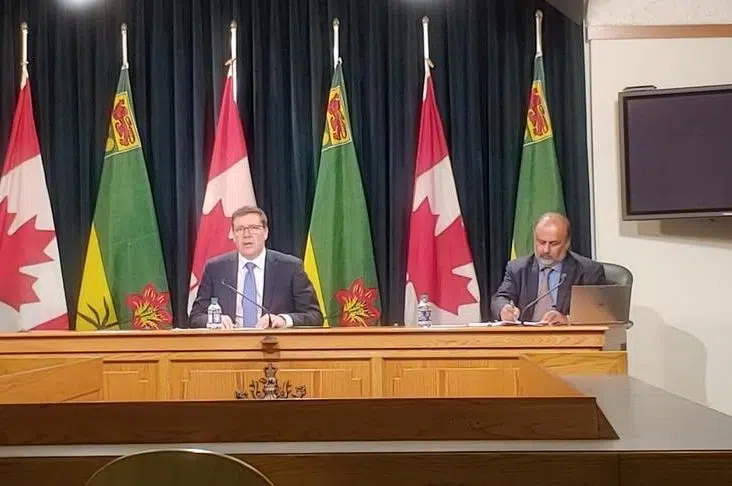Saskatchewan is set to ramp up its testing regimen for COVID-19.
In a media release Thursday, the provincial government said it will soon start proactively testing at-risk populations, as well as any Saskatchewan resident who works outside the home — especially those who are returning to work as part of the Re-Open Saskatchewan plan.
The government also announced there were five new COVID-19 cases and 13 more recoveries. Four of the new cases are in the La Loche area and one is in the Regina region.
The number of active cases fell for a fourth straight day. Since reaching a peak of 209 on Sunday, the number has dropped to 178 as of Thursday.
Changes in testing
The government said it will test:
- All patients upon admission or in advance of a planned admission to an acute care hospital for a stay anticipated to be longer than 24 hours. That includes all expectant mothers entering a health facility to give birth;
- Immunocompromised asymptomatic individuals, including cancer patients in advance of undergoing immunosuppressive procedures such as chemotherapy;
- All health staff working with immunocompromised patients; and,
- Employees in high-volume work settings such as factories and industrial settings.
Currently, testing has been done on all residents identified by public health as a contact of someone who had COVID-19, individuals who are at high risk due to the active spread of COVID-19 in their workplace or community, all residents upon admission and readmission to long-term and personal care homes, and all residents and staff in long-term and personal care homes upon notification of a COVID-19-positive resident or staff member.
The Saskatchewan Health Authority (SHA) is to provide further details on expanded testing next week.
The SHA also is to increase case finding in homeless and vulnerable populations as well as in First Nations and Mtis communities.
“If widespread transmission occurs in a community, a community-wide testing initiative would be implemented,” the release said.
The numbers
There have been a total of 582 cases in the province since the pandemic hit and 398 recoveries. Six Saskatchewan residents have died so far.
The active cases comprise 146 in the far north, 21 in the northern region, nine in Saskatoon and one each in Regina and the central region.
There currently are 10 people in hospital, including seven (three in the north, three in Saskatoon and one in Regina) who are receiving inpatient care. Three people are in intensive care in Saskatoon.
The total number of cases include 302 community contacts, 139 travellers, 67 without a known exposure and 74 that are under investigation by local public health.
The total includes 48 health-care workers, some of whom may have contracted the virus outside of work.
Of the 582, 210 have been from the far north, 163 have been from the Saskatoon area, 106 live in the north, 76 reside in the Regina area, 15 have been from the south and 12 have been from the central region.
Age-wise, 81 cases involve people aged 19 and under. There have been 205 cases in the 20-to-39 age range, 180 in the 40-to-59 range, 98 between the ages of 60 and 79, and 18 in the 80-and-over range.
The 572 tests done Wednesday increased the total number performed in the province to date to 38,728.
Victoria Day long weekend
The government reminded residents that public health orders remain in place for the long weekend.
Gatherings are limited to a maximum of 10 people, hand-washing and physical distancing are still recommended, and playgrounds and shared outdoor equipment should be avoided.
“Residents with cabins in the southern half of the province may visit their properties, but should stay on their own property and limit visits to local stores to only essential trips,” the release said.
“With non-essential travel restricted in the Northern Saskatchewan Administrative District at this time, residents with cabins in the north cannot visit their properties until those travel restrictions are lifted.”
On Tuesday, Phase 2 of the Re-Open Saskatchewan plan will begin. Retail businesses, shopping malls, some personal services (including hairstylists/barbers, registered massage therapists, acupuncturists and acupressurists) and public markets and farmers markets can reopen.
More to come.







